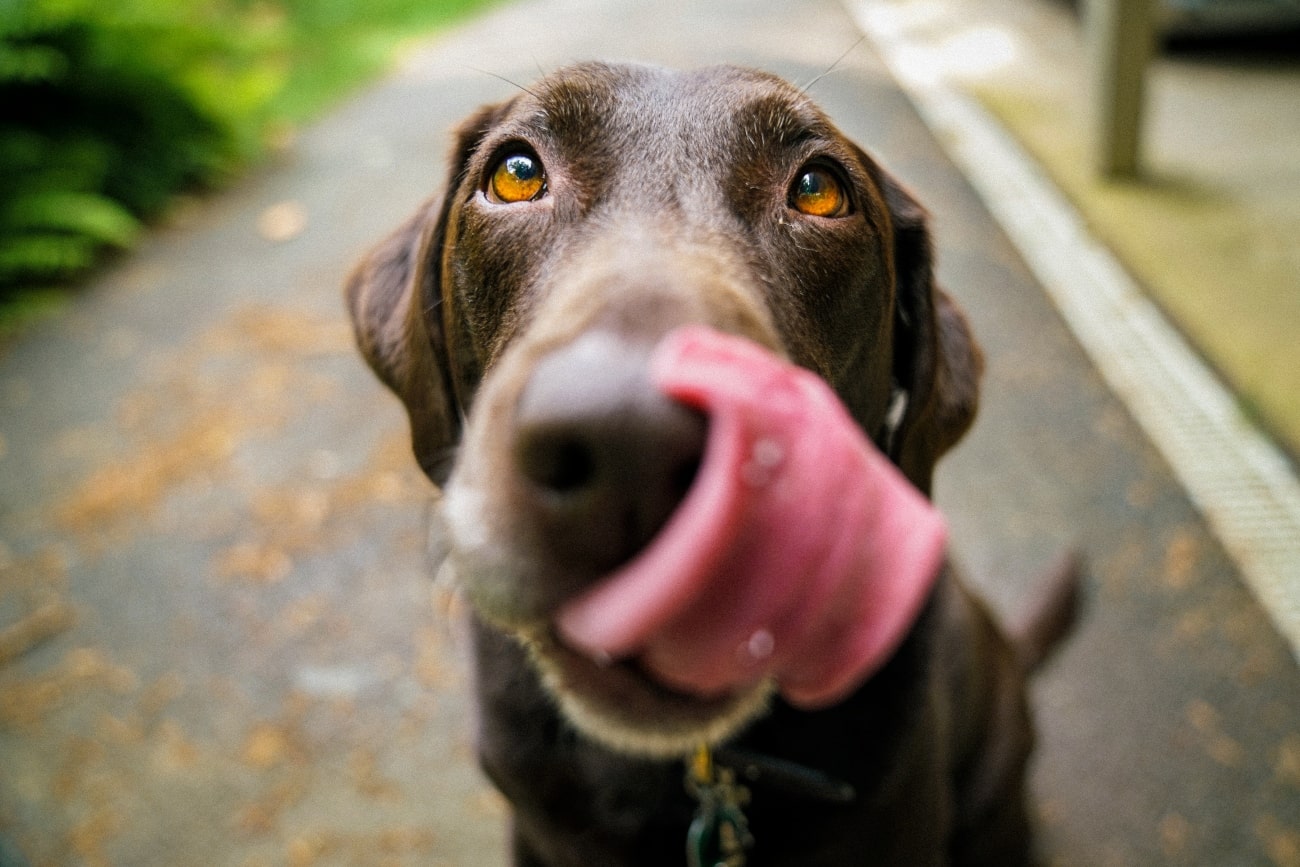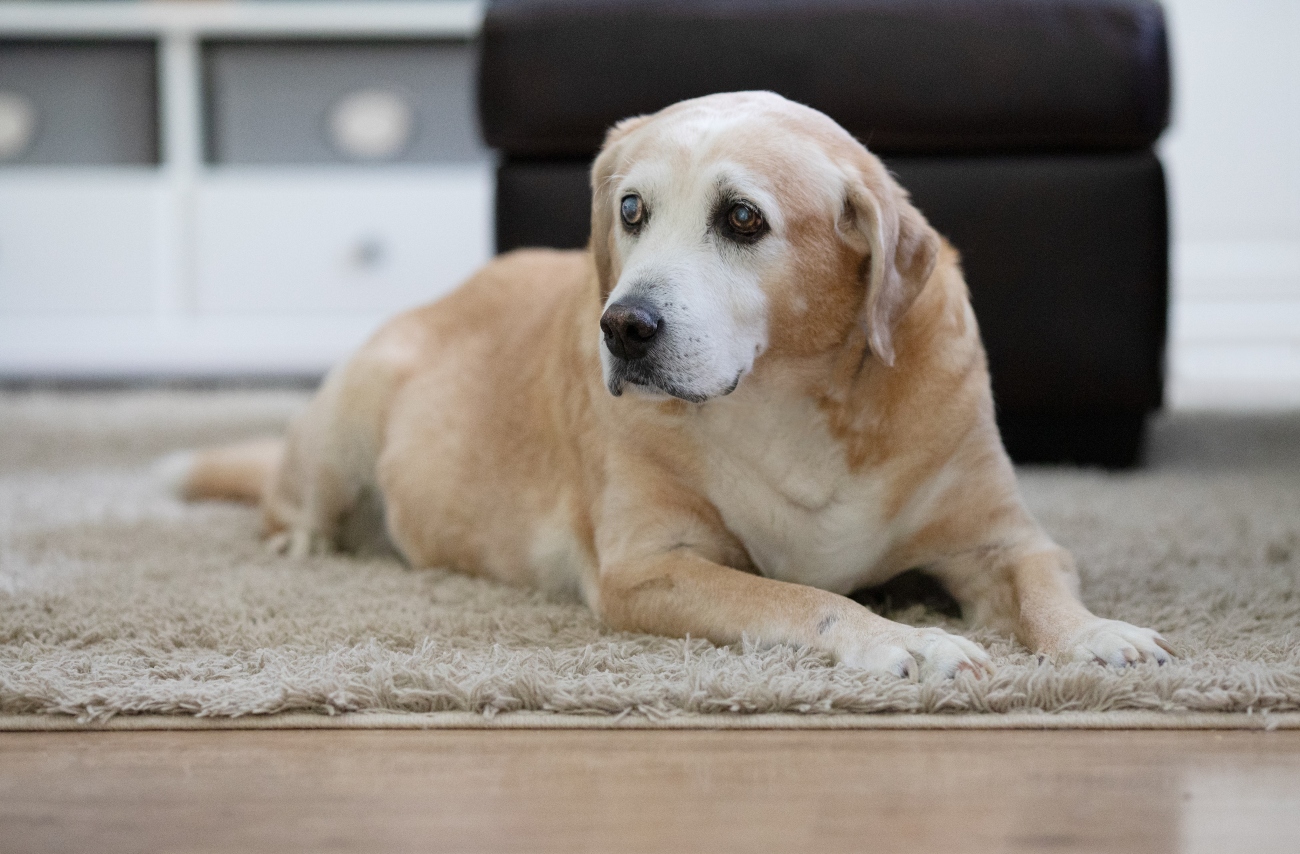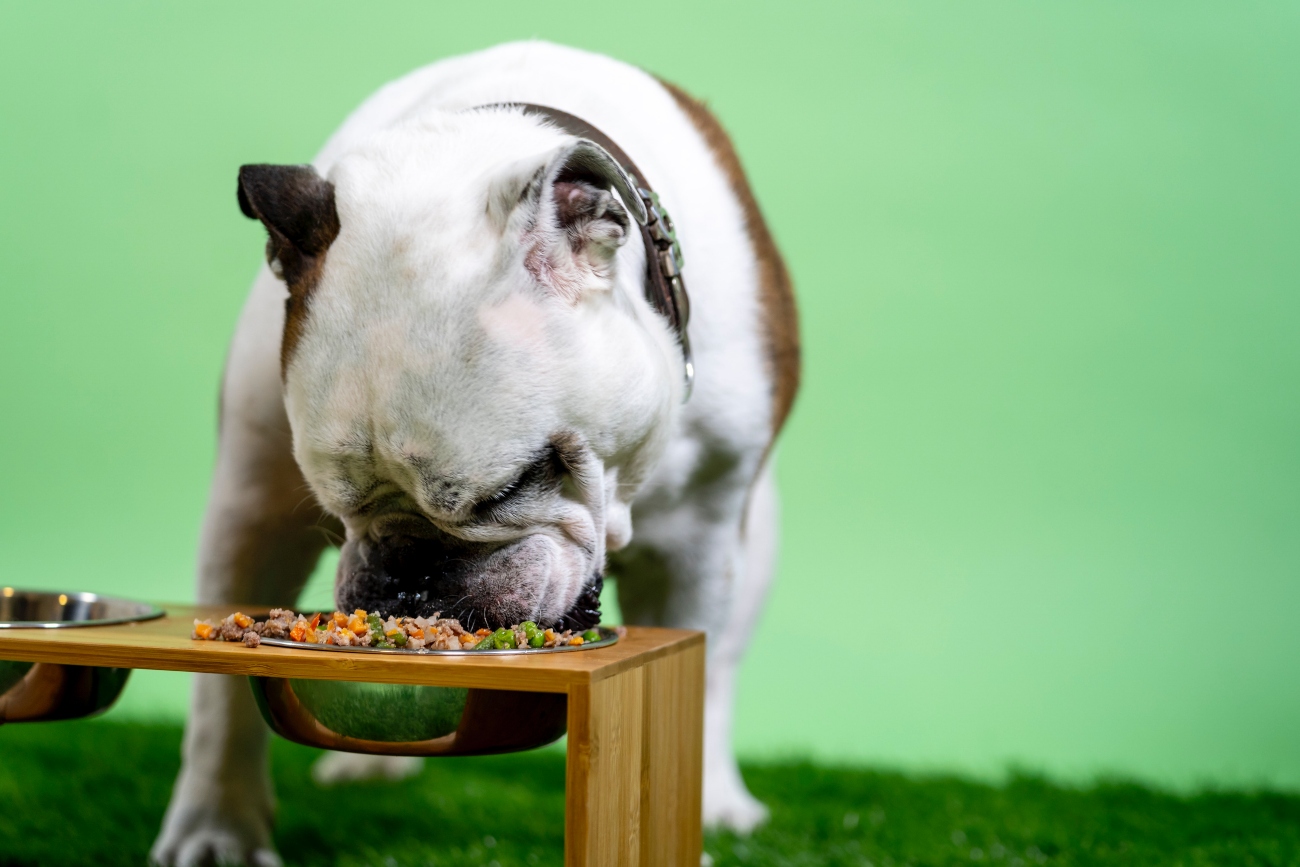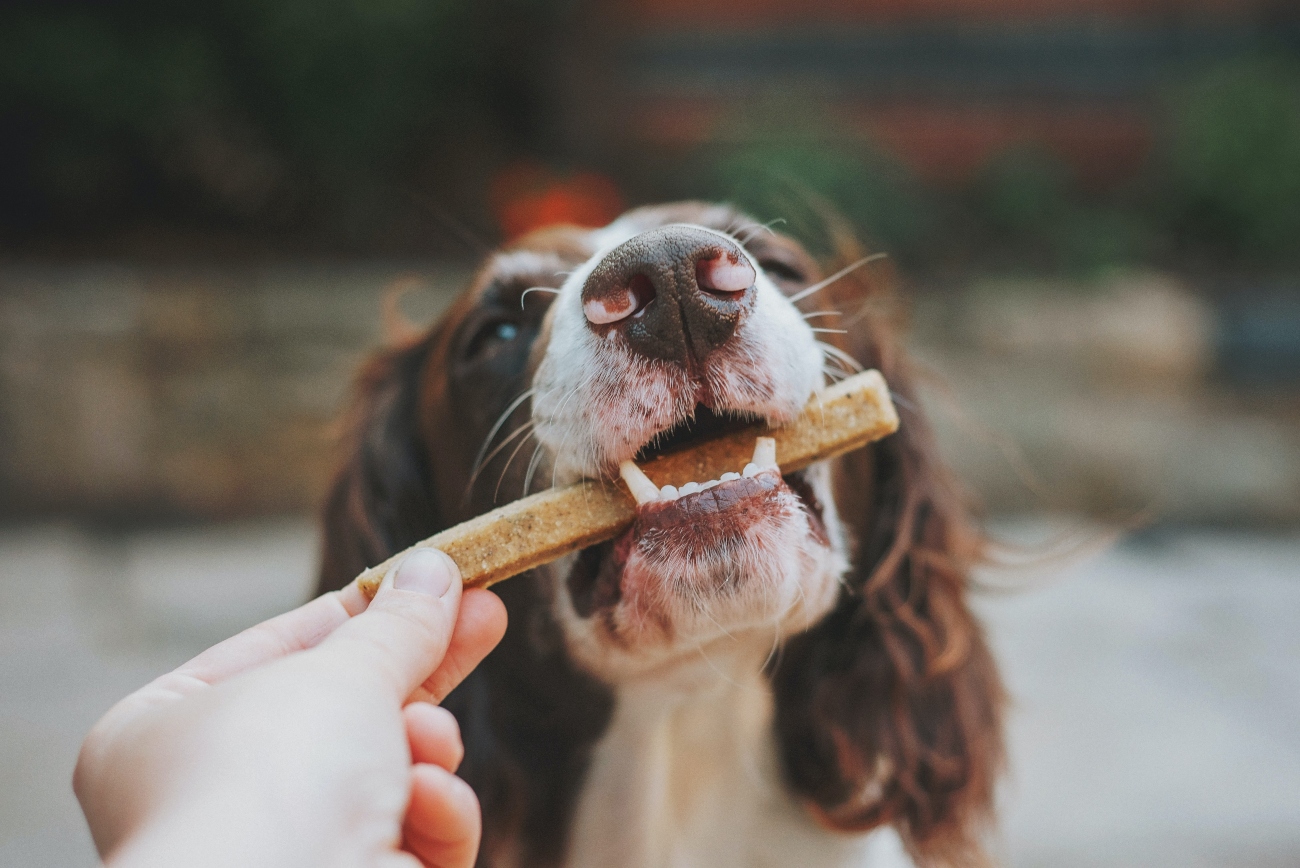
Old dog refusing to eat? Here are 20 things to try
12th April, 2022
Is your senior dog giving a brief sniff of their bowl, then walking away without touching their food? The sight of an older dog rejecting their food can be worrying – sometimes with good reason, as it may indicate underlying health issues. But it doesn’t always point to an illness. Often, it's more a change in their surroundings or mood that’s caused them to refuse their dinner.
Whatever the cause, if your older dog is eating less you’ll want to get to the bottom of it. After all, it's still essential for older dogs to get the correct levels of nutrition each day. In fact, keeping your older dog properly nourished is one of your most important roles as a caring dog owner – right up there with having some suitable pet insurance for older dogs, to help cover against any eventualities in their old age.
In this article, we're going to run through some of the possible causes of this sudden refusal to eat – and spell out a few tricks to get them hurrying back to their bowl.
Contents
- Don't panic
- Know when to seek help
- Prepare for the vet's questions
- Some illnesses can affect appetite
- Try a change of food
- Mix wet and dry food
- A miracle ingredient? Chicken broth
- Try warming their food
- Use lots of encouragement
- Continue the praise after mealtime, too
- Make sure food is easily accessible
- Provide plenty of fresh water
- Remember portion control
- Make sure feeding time is always calm
- Cut out the scraps and treats
- Monitor their teeth
- Check for constipation
- Have they lost their sense of smell and/or taste?
- Be sensitive to their behaviour
- Review their medications
1. Don't panic
Fluctuating appetite levels are a fairly normal occurrence for most dogs. Older animals, in particular, can be more given to going off their food for spells at a time. It's quite possible that this temporary fasting is largely down to their change of lifestyle now that they have entered old age.
After all, older dogs will typically have less energy than their younger counterparts, so they will be burning less of that energy by dashing around the house or garden, or on those long energetic walks they used to love. Older dogs also have slower metabolisms: this means that they need fewer calories to maintain energy levels. Result: an older dog will typically be less hungry than a younger animal.
If your senior pet is still eating – just not in the quantities they once were – and is not showing dramatic weight loss, you shouldn't have much to worry about. In fact, among older dogs, the opposite scenario – eating more food than their limited exercise regime is burning off – is often a bigger concern. However, if your dog is showing signs of rapid weight loss, you could learn more about the reasons to this happening in our recent blog.

2. Know when to seek help
As a rule of thumb, if your dog has not touched their food for a day or more, it's probably time to seek advice. After all, if your canine ignores their food for a few hours, they may just not be in the mood. Significantly longer, however, and you should consider getting on the phone to your vet.
This is for two reasons. Firstly, a fasting dog will not be getting the regular nutrition they still need, even in old age, to keep their bones, joints and organs healthy. Secondly, skipping meals (and, if this also applies, bypassing their water bowl) could be the first sign of something more serious.
It's always good to have a sense of what's normal for your dog, so that you can seek advice if their behaviour suddenly seems to be abnormal.
Your vet is the obvious person to consult here. Alternatively, if you have pet insurance for older dogs with us here at Petwise, you'll have unlimited access to our 24-Hour Vet Helpline. This means that you can call any time you have a concern around your pet's health, and speak to one of our team of experienced veterinary professionals.
Prepare for the vet's questions
If and when you do call your vet or take your dog into the surgery, be prepared to answer a few questions about your pet's eating habits.
For example, your vet is likely to ask:
- How much are they eating now,
- How much were they eating before?
- Have they gone off their food altogether, or just become much fussier?
- How often are they fed, and at what times of the day?
- Have there been any changes to their environment or diet recently?
- Has the lack of appetite been accompanied by vomiting or diarrhoea?
They should also ask about your dog's weight – whether it is stable, or has dropped. Lastly, they may ask you whether there is anything else about their health or general demeanour that is concerning you.
The clearer your answers are, the more easily the vet will be able to build up a picture of what's happening and, if necessary, prescribe some medication or recommend a medical procedure to help. If you have some pet insurance for senior dogs, your policy should be able to help with the costs involved in these medications and procedures.
4. Some illnesses can affect appetite
Sometimes the reduced appetite will be the by-product of a more serious illness that has developed. These are a few of the conditions that can take the edge off your dog's hunger:
Addison’s disease – In this disease, the adrenal glands are not producing the necessary hormones to control the body’s functions. We discussed Addison's disease in our article on diabetes in older dogs, as it presents similar symptoms to the latter condition.
Cancer – This disease is well known in humans: however, it is also the leading cause of death in dogs aged 10 or over. Common types include lymphoma, plus skin, breast and bone cancer. All can lead to diminished appetite in dogs. Treatment, though expensive, is available, and your pet insurance for older dogs may contribute to the costs.
Liver problems – Typically either genetic or a result of ageing, liver issues can affect a dog’s digestion, and therefore their appetite, too.
Pancreatitis – This condition, an inflammation of the pancreas, undermines both digestion and blood sugar regulation – both linked to appetite.
5. Try a change of food
If your vet doesn't detect any causes for your dog's reduced appetite, it might just be time for a change in their diet. Perhaps you can try some different products, and make mealtimes a bit more interesting.
In fact, as a general rule, dogs are creatures of habit who tend to prefer a similar diet day in, day out. However, it's perfectly possible that their current food isn't stimulating their appetite anymore. Why not try them on something new, to see if the new smells and tastes revitalise them?
Remember, though, that dogs' stomachs can easily be upset by a sudden change of food, so it's best to introduce any new foods into their diet gradually. You might want to introduce the new food over a period of four days, starting with the old and new food in a 1:3 ratio on the first day, moving to 1:1 on the second day and so on.

6. Mix wet and dry food
You may have been mostly using dry food on your dog up until now, so why not ring the changes by introducing some wet food? The taste and texture of wet food can be very appealing to many dogs. Mixing the two can certainly give your hound’s usual bowl of dry food a bit of a lift.
Introducing wet food can be effective for another reason, too. Older dogs will often lose their sense of smell and, as a result, have trouble producing the saliva that helps them to chew their food. Mixing the dry food with a little wet should make meals go down easier.
7. A miracle ingredient? Chicken broth
If your dog's food doesn't seem to be exciting them anymore, have you tried adding a little low-sodium chicken broth on top? This brilliant ingredient will instantly give the dish some added moisture and flavour, hopefully boosting your pet’s appetite once again.
8.Try warming their food
Dogs tend to enjoy their food either warm or at room temperature – like Goldilocks, neither too hot nor too cold. If you take some food straight out of the fridge and place it before them, it's unlikely to appeal.
Warming up their food in the microwave or on the hob will often make it more appetising. For one thing, it will release more of the food's natural odours, which may get your dog's nostrils twitching hungrily. Just remember to test that it's nicely warm, and not too hot, before you put it in front of them.
9. Use lots of encouragement
If your dog seems uninterested in their food, some extra positivity and encouragement from you may win them round. Dogs are very sensitive to our emotions, and will easily pick up on any tension or anxiety they detect in us. So suddenly introducing a new food into your dog's diet, plonking it down in front of them and demanding that they eat up simply isn't going to work for them. If anything, it will simply create some stressful and negative associations around food, and make them even less inclined to eat than they were previously.
A much better strategy is to adopt a kind, encouraging voice and body language. Use praise and affection to help steer them towards their food.
10. Continue the praise after mealtime, too
Similarly, praise your dog after they have eaten well. You know how much your dog loves praise from you. But do they know that it makes you happy to see them eat a good meal? If you do see them tucking into some food, why not praise them and let them know they're doing a great job?
Knowing that eating a decent meal pleases their beloved owner is likely to make them more inclined to do the same again next time.
11. Make sure food is easily accessible
It's a good idea to have some food in a few locations around the house – on every floor, for example. Older dogs can suffer from various health issues, such as joint pains or arthritis, which can make movement difficult. A hard trip up or down stairs to get to food could be enough to put them off eating altogether. Make sure that they don't have to go to too much pain or effort to reach their bowl.
12. Provide plenty of fresh water
Water is an essential part of your dog's daily nutritional intake: both for keeping your pet hydrated, and also because it helps with digestion. If they’re bypassing the water bowl – because the water hasn't been changed for a day, for example, and is smelling a little stale, or even because it's at the wrong temperature – this may also cause them to go off their food. Always have fresh water freely available.
13. Remember portion control
Your dog may simply no longer need the portion sizes you are giving them. If, for example, their weight seems normal, you may not have to worry about cutting back their portion size a little.
There is a very simple test that you can do to check whether your dog is at a healthy weight. Just move your hands along their sides: if you can feel their ribs, their weight is healthy (if you can see their ribs, they are likely to be underweight). If, on the other hand, the ribs are inaccessible beneath a covering of fat, they may be overweight. The same goes for dogs with a noticeably rounded stomach.
You may want to decrease their portion size, make sure that they are getting enough exercise to stimulate their hunger, and/or look for a low-fat, weight-control dog food.
If you’re wondering how several national lockdowns have affected your dog's weight, you may want to read our article, Has your pet gained weight during the pandemic?
14. Make sure feeding time is always calm
Dogs, and older canines in particular, often just need some peace and quiet while they eat. They don't want to be forced to gobble up their food in a busy thoroughfare of the house, with kids noisily rushing past. Make sure that mealtimes are peaceful, so your dog can concentrate on their food and not be distracted by other goings-on.
15. Cut out the scraps and treats
It’s possible that your dog is not hungry when mealtime comes around, because it’s been fed little scraps from your table during the day. Or, it may have been given lots of treats that make regular mealtimes seem a little plain by comparison. Try cutting out these little extras for a while, and see if your dog's interest in food returns.

16. Monitor their teeth
If your dog is suffering from any dental problems, these are likely to make them less willing to eat. Painful teeth or gums will take a lot of the pleasure out of mealtimes. Ask your vet to take a look at your dog's teeth. If any medications or medical procedures are required, your pet insurance should be able to help with some of the costs.
If, on the other hand, your vet can't find a problem but your dog is clearly struggling with solid foods, you could switch them to soft foods for a while to see if that helps.
17. Check for constipation
Older dogs are more susceptible than younger animals to this uncomfortable condition. Constipation – the inability to effectively expel waste matter – can leave an older dog feeling full and heavy. It follows that a dog with constipation will be much less inclined to eat.
If your dog is constipated, they probably just need more moisture in their diet. This can obviously come through lots of fresh water. However, if your dog isn't a big drinker, you can get more moisture into mealtimes by mixing gravy or broth into their dry food, or introducing some wet food.
Also look out for high-fibre foods, as well as those containing helpful digestive enzymes such as probiotics and prebiotics. These clever ingredients help to maintain levels of good, digestion-aiding bacteria in the stomach.
18. Have they lost their sense of taste and/or smell?
You will probably be aware that your dog's hearing and eyesight tend to diminish in old age. What you may not know is that two other key senses, taste and smell, also tend to tail off in later years. This can mean that the food in their bowl is less exciting to them than it once was. Again, consider mixing gravy into their kibble (dry food) or moving them onto a wet food diet to help with this.
19. Be sensitive to their behaviour
Any major change to your senior dog's lifestyle – new people or pets in the home, or a house move – can disrupt their normal routine and cause them to go off their food. You may just need a little patience as your dog adapts to its new circumstances. Show them lots of love and affection and try to establish new routines as quickly as possible.
20. Review their medications
As the owner of an older dog, you may well have noticed that your canine companion needs a few more medications as they grow older. As the body ages, medicines are often required to relieve pain, prevent infections or simply manage decline.
Some of these medications, however, can act as appetite suppressants, so it may be that your dog's diminished hunger is down, in part, to the medicines that they’re taking. Medications known to have this effect include antibiotics, anti-inflammatories, and some painkillers.
You may want to ask your vet about changing your dog's medication to an alternative product that won't affect their appetite.
Or, if a suitable replacement can’t be found, your vet may prescribe an appetite stimulant. Mirtazapine is an example of a medication that can help dogs to recover their appetite.
Pet insurance for older dogs, from Petwise
Dogs can experience a change of appetite at any stage of their life. However, if your older dog is suddenly showing less interest in their food, it's definitely worth looking into – as diminished appetite in older dogs can sometimes be a sign of something more serious.
If your dog snubs their food for more than a day or so, we'd recommend getting some professional advice. It could be that the reduced hunger is a sign of something more serious, requiring veterinary attention and perhaps treatment.
Watching your dog go off their food can be a worrying experience. But, as we've seen, it can have lots of causes – not all of them serious. Some advice from a veterinary professional should soon clear up the situation.
And that professional advice, via our 24-Hour Vet Helpline, is just one of the benefits we're pleased to offer customers of our insurance for older dogs.
Get a quote today.